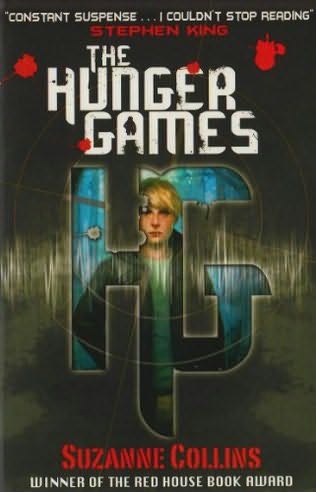
The Hunger Games by Suzanne Collins is a bit (massive understatement!) of a departure for people interested in her best selling Underland series (Gregor the Overlander et al...). Before I type another word, I have to state that THG is not a book intended for my usual target audience of upper elementary school readers. Unless you're in middle school or beyond, THG is NOT the book for you.
Collins has created a very bleak, distopian future in a barely recognizable North America. The United States and other sovereign nations have imploded upon themselves so long ago that they aren't even remembered. Indeed, citizens in the book have only the vaguest idea that there once existed a land known as "North America." Now, there is one capitol city known as Panem. The capitol is surrounded by 12 subservient client states known as districts.
Sometime in the not too distant past, the districts rebelled against Penam which ruled over them like a feudal lord. Originally, there were 13 districts, but the last was wiped out by the capitol during the failed uprising. Life in the Districts became miserable. Families scrape together subsistence-level farming and hunting while the citizens of Penam live lives of incomprehensible luxury for the citizens of the Districts. In order to further punish the 12 remaining districts, the Hunger Games were established.
The premise of the games is brutally simple. Each year during a ceremony called "The Reaping," one boy and one girl ages 12-18 are chosen from each district. Each eligible child has one name in the lottery for each birthday they have between 12 and 18. (Here, Collins borrows heavily from Shirley Jackson's classic story "The Lottery," but hey if you're going to borrow, borrow from the best.) Once chosen you are removed to the capitol where you will participate in the games in a specially prepared arena. Once in the arena, contestants are given weapons and supplies, and the only rule is that competitors kill each other until only one remains. According to the book, Collins is focusing this book (and its subsequent sequels) on "the effects of war and violence on those coming of age." The violence is brutal, intense, but not gratuitous. The games are broadcast live in every district, and everyone is forced to watch them, just another reminder of Panem's dominance over the defeated Districts.
In an interview with scholastic Collins said, "It's hard to choose one element that inspired The Hunger Games," says Suzanne. "Probably the first seeds were planted when, as an eight-year-old with a mythology obsession, I read the story of Theseus. The myth told how in punishment for past deeds, Athens periodically had to send seven youths and seven maidens to Crete where they were thrown in the Labyrinth and devoured by the monstrous Minotaur. Even as a third grader, I could appreciate the ruthlessness of this message. ‘Mess with us and we'll do something worse than kill you. We'll kill your children.'
The story centers around Katniss Everdeen from the bleak, coal-producing District 12. Through a heartbreaking series of circumstances (I won't spoil it, but it's well done, if not a mite predictable), Katniss ends up volunteering herself for the games. Within a day, she and her fellow District 12 contestant Peeta are being whipped off to the capitol in preparation for the competition.
During these scenes Collins has fun skewering the pampered and ridiculous life of the citizens of Panem, especially when contrasted with the hardscrabble existence of people in the Districts. Presented with abundant food for the first time in their lives, Katniss and Peeta eat to the point of illness. Katniss revels in the luxury, but never forgets a promise she mad to win the games and return home. (It has to do with the circumstances that found her volunteering for the games in the first place.)
The final portion of the book focuses the games themselves. As one would expect, there are some very gruesome scenes here. Collins maintains suspense throughout, an admirable feat, given that we are almost certain of the ultimate outcome as far as who the winner will be. (If you're not sure about what I'm talking about, then I'm not telling...)
Overall, Collins has created a disturbing yet plausible future. These distopian visions are some of my favorite types of stories, and although it comes close at times, it doesn't quite add up to my all-time favorite in the genre, Richard Bachman's The Long Walk. THG is the first book in a proposed trilogy, but I could not find any information on any forthcoming volumes. Recommended, but only for readers middle school and up.
3 comments:
I know I'm not suppose to read it so I recommended it to my brother.
weird
Amazing book! Suzanne Collins rules!
Post a Comment